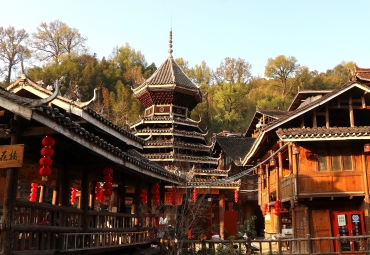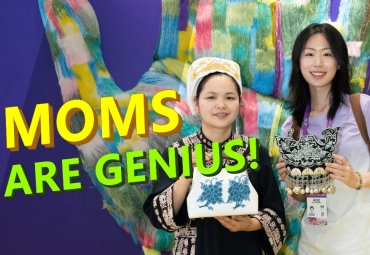Wu Pinxian (1945- )
Wu Pinxian has been given the title of the inheritor of the Grand Song of the Dong ethnic group, a national intangible cultural heritage.

Wu Pinxian (in bright blue) and Dong singers. [Photo/cnr.cn]
She was born in 1945 and started to learn the grand songs at the age of six. She was said to be the most diligent of students, and regarded as the best for her good voice and natural talent.
At 13-years-old, Wu was selected into the Beijing National Song and Dance Troupe, and met Chairman Mao when giving a performance in Beijing.
She was in the Qiandongnan Song and Dance Troupe from 1964 to 1970. During the 14 years from 1970, she was sent to do rural farming. In 1984, she returned and served as an officer in local government until her retirement in 1996. She taught students the grand songs in local schools from 2000 to 2004.
She said that the grand songs have rich and interesting content, enticing people to feel connected to a unified family. Making friends with songs and conveying emotions through them are the cultural cores of the grand songs.
With its lack of musical accompaniment and beats, learning the grand songs requires strong feelings, harmony, and rhythm, as well as an ability of comprehension. During her lessons, Wu Pinxian clearly explains the stories behind the songs lessons, teaching students the folk songs, as well as the truth and joy of life.
She often says that singing the grand songs is a good way to bring peace to people and help them get them rid of worries from the outside world.

Wu Pinxian teaches students the Grand Song of the Dong minority. [Photo/cnr.cn]

A student learns the Grand Song of the Dong minority. [Photo/cnr.cn]
All rights Reserved. 京ICP备13028878号-8







 Overview
Overview Guiyang
Guiyang Guian New Area
Guian New Area Liupanshui
Liupanshui Anshun
Anshun Qianxinan
Qianxinan Qiandongnan
Qiandongnan Qiannan
Qiannan Zunyi
Zunyi Tongren
Tongren Bijie
Bijie Guizhou commits to culture preservation and rural vitalization
Guizhou commits to culture preservation and rural vitalization Guizhou voice at 2025 national two sessions
Guizhou voice at 2025 national two sessions Meet the 'genius moms' at Shenzhen cultural fair
Meet the 'genius moms' at Shenzhen cultural fair 

